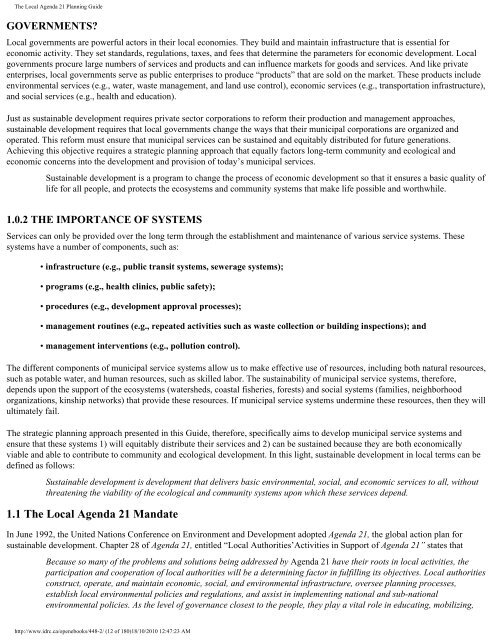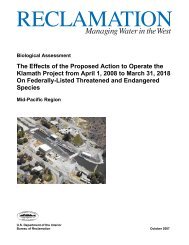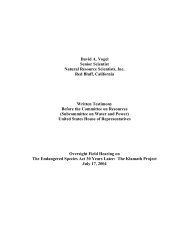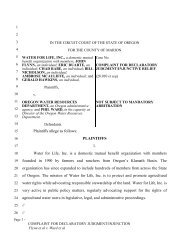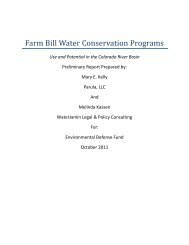The Local Agenda 21 Planning Guide - Democrats Against UN ...
The Local Agenda 21 Planning Guide - Democrats Against UN ...
The Local Agenda 21 Planning Guide - Democrats Against UN ...
You also want an ePaper? Increase the reach of your titles
YUMPU automatically turns print PDFs into web optimized ePapers that Google loves.
<strong>The</strong> <strong>Local</strong> <strong>Agenda</strong> <strong>21</strong> <strong>Planning</strong> <strong>Guide</strong><br />
GOVERNMENTS?<br />
<strong>Local</strong> governments are powerful actors in their local economies. <strong>The</strong>y build and maintain infrastructure that is essential for<br />
economic activity. <strong>The</strong>y set standards, regulations, taxes, and fees that determine the parameters for economic development. <strong>Local</strong><br />
governments procure large numbers of services and products and can influence markets for goods and services. And like private<br />
enterprises, local governments serve as public enterprises to produce “products” that are sold on the market. <strong>The</strong>se products include<br />
environmental services (e.g., water, waste management, and land use control), economic services (e.g., transportation infrastructure),<br />
and social services (e.g., health and education).<br />
Just as sustainable development requires private sector corporations to reform their production and management approaches,<br />
sustainable development requires that local governments change the ways that their municipal corporations are organized and<br />
operated. This reform must ensure that municipal services can be sustained and equitably distributed for future generations.<br />
Achieving this objective requires a strategic planning approach that equally factors long-term community and ecological and<br />
economic concerns into the development and provision of today’s municipal services.<br />
Sustainable development is a program to change the process of economic development so that it ensures a basic quality of<br />
life for all people, and protects the ecosystems and community systems that make life possible and worthwhile.<br />
1.0.2 THE IMPORTANCE OF SYSTEMS<br />
Services can only be provided over the long term through the establishment and maintenance of various service systems. <strong>The</strong>se<br />
systems have a number of components, such as:<br />
• infrastructure (e.g., public transit systems, sewerage systems);<br />
• programs (e.g., health clinics, public safety);<br />
• procedures (e.g., development approval processes);<br />
• management routines (e.g., repeated activities such as waste collection or building inspections); and<br />
• management interventions (e.g., pollution control).<br />
<strong>The</strong> different components of municipal service systems allow us to make effective use of resources, including both natural resources,<br />
such as potable water, and human resources, such as skilled labor. <strong>The</strong> sustainability of municipal service systems, therefore,<br />
depends upon the support of the ecosystems (watersheds, coastal fisheries, forests) and social systems (families, neighborhood<br />
organizations, kinship networks) that provide these resources. If municipal service systems undermine these resources, then they will<br />
ultimately fail.<br />
<strong>The</strong> strategic planning approach presented in this <strong>Guide</strong>, therefore, specifically aims to develop municipal service systems and<br />
ensure that these systems 1) will equitably distribute their services and 2) can be sustained because they are both economically<br />
viable and able to contribute to community and ecological development. In this light, sustainable development in local terms can be<br />
defined as follows:<br />
Sustainable development is development that delivers basic environmental, social, and economic services to all, without<br />
threatening the viability of the ecological and community systems upon which these services depend.<br />
1.1 <strong>The</strong> <strong>Local</strong> <strong>Agenda</strong> <strong>21</strong> Mandate<br />
In June 1992, the United Nations Conference on Environment and Development adopted <strong>Agenda</strong> <strong>21</strong>, the global action plan for<br />
sustainable development. Chapter 28 of <strong>Agenda</strong> <strong>21</strong>, entitled “<strong>Local</strong> Authorities’Activities in Support of <strong>Agenda</strong> <strong>21</strong>” states that<br />
Because so many of the problems and solutions being addressed by <strong>Agenda</strong> <strong>21</strong> have their roots in local activities, the<br />
participation and cooperation of local authorities will be a determining factor in fulfilling its objectives. <strong>Local</strong> authorities<br />
construct, operate, and maintain economic, social, and environmental infrastructure, oversee planning processes,<br />
establish local environmental policies and regulations, and assist in implementing national and sub-national<br />
environmental policies. As the level of governance closest to the people, they play a vital role in educating, mobilizing,<br />
http://www.idrc.ca/openebooks/448-2/ (12 of 180)18/10/2010 12:47:23 AM


